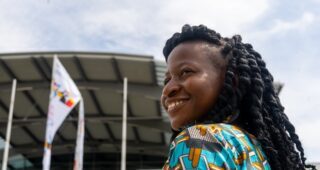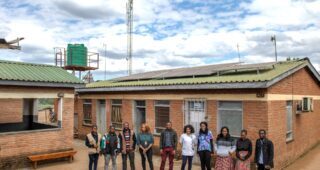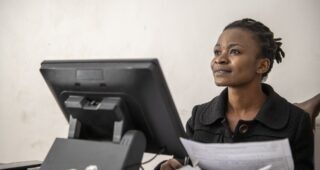A Mother Mentors Her Rural Community—and Her Children
David and Leah live in a cozy brick house in Malawi with their four children, surrounded by sunflowers and plots of maize, ground nuts, and soy beans. During the week, David stays on the homestead and tends the crops, while Leah walks several kilometers to the Mchinji District Hospital—where she works as a mentor mother, counseling women at the antenatal care clinic.
David and Leah met at the boma [town center] ten years ago. “I came to the market to sell fish, and I caught a wife,” he says with a chuckle. Soon after, they married, and David moved to Leah’s village and acquired a half-acre of land.

Angela, 4, helps her father on the farm while her mother is at the hospital. She likes to water the crops and check the chicken coop for eggs—along with helping to keep an eye on her 2-year-old brother, Emmanuel. Angela likes working alongside her dad, but she also looks forward to one day walking down the worn path to the local school, just like her older sister and brother.
“It is important that my children go to school,” says David. “The best future is for those who have an education.”
David and Leah hope that one day Angela will become a nurse or a doctor so that she can help save lives in the community—just as her mother is now doing as a mentor mother.
Like many women in this rural community, Leah has only finished Standard 6 (comparable to 6th grade in the United States), but she has been trained by the Elizabeth Glaser Pediatric AIDS Foundation (EGPAF) to educate other women about HIV. She provides counseling and connects women to HIV services if they need it. Leah knows what it is like to be diagnosed with HIV, and she shares her experience with her HIV-positive clients to help them accept their status and glean hope.
“I was pregnant with the second baby in 2009, when I was tested for HIV at the antenatal clinic,” says Leah. “When I received the [HIV-positive] result, I felt so shaky. It was by the grace of God that I accepted my status—because at that time it was really hard. There was so much more stigma than today. When I told my relatives, they refused to eat with me. They refused to share things.”

“I was a bit tense when we got the result,” says David. “I was hearing from people that HIV is dangerous. I was seeing other people who were very sick, so I thought my wife, or even I, might become ill to that extent. But after some days I accepted it.” David was also tested for HIV, and the result was negative. He remains HIV-free.
“The big man [David] is my rock,” says Leah. “He came with me to my check-ups at the antenatal clinic and he made sure that I adhered to medication, especially when I was pregnant and breastfeeding during PMTCT [prevention of mother-to-child HIV transmission].
“I need to work hard so that she can have a long life,” says David. “That is my motivation.”


Thanks to PMTCT, their daughter Prisca was born HIV-free. Five years later, the couple decided to expand the family and was blessed with Angela, followed by Emmanuel. Leah adhered to her treatment throughout, and all of the children are HIV-free, including their oldest son, Michael, who was born prior to her diagnosis.
In 2015, Leah’s sister alerted her to a position at the hospital for mentor mothers—with mothers2mothers, an EGPAF partner that employs mothers living with HIV to support newly diagnosed mothers to access lifesaving treatment for themselves and their babies.
“The criteria was that it has to be a mother who is having a baby or has completed the PMTCT cascade,” says Leah. “The mother should know how to read and write and should be able to stand in public and disclose her HIV status. I was invited for an interview and was successful.”

“When I talk to mothers who are denying their HIV status or are not taking their ARVs [antiretroviral medication], that is when I tell them that I have HIV and that I have a home full of healthy children. I tell them that I have disclosed to my husband and that he has accepted my status. That way they can say to themselves, ‘This person is living with HIV, so can I.'”
“Leah has changed the perception of HIV and AIDS in her community,” says Vincent Nyapigoti, an EGPAF-supported nurse at Mchinji District Hospital funded. “Since she started working as a mentor mother, the number of clients defaulting from PMTCT and antiretroviral programs, from her area has been reduced, and we now experience a high number of couple testing from her home area.”
“It has made her the right hand for the community,” says David. “Being a mentor mother gives hope to families in all of the villages served by the hospital. And it gives me hope that both of my daughters can follow in their mother’s footsteps.”

EGPAF’s work in Malawi is funded by the President’s Emergency Plan for AIDS Relief (PEPFAR) through the United States Centers for Disease Control and Prevention (CDC).
Team EGPAF
Malawi
General



